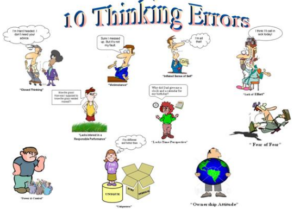As we go about our daily routines, our internal monologue narrates our experience. Our self-talk guides our behavior and influences the way we interact with others. It also plays a major role in mental errors and how you feel about yourself, other people, and the world in general.

Keep learning: How to Create Honest Employee Trust and Empowerment
Quite often, however, our conscious thoughts aren’t realistic; they’re irrational and inaccurate.
Believing our irrational thoughts can lead to problems including communication issues, relationship problems, and unhealthy decisions.
For a long time, researchers and economists believed that humans made logical, well-considered decisions. In recent decades, however, researchers have uncovered a wide range of mental errors that derail our thinking. A bad thing, yes?
Sometimes we make logical decisions, but there are many times when we make emotional, irrational, and confusing choices.
Whether you’re striving to reach personal or professional goals, the key to success often starts with recognizing and replacing inaccurate thoughts and avoiding mental mistakes.
The most common thinking errors can be divided into these ten categories, some of which are adapted from David Burns’s book, Feeling Good: The New Mood Therapy.
Loss aversion
Loss aversion refers to our tendency to strongly prefer avoiding losses over acquiring gains. Research has shown that if someone gives you $10, you will experience a small boost in satisfaction, but if you lose $10, you will experience a dramatically higher loss in satisfaction.
Yes, the responses are opposite, but they are not equal in magnitude. Definitely not.
Our tendency to avoid losses causes us to make silly decisions and change our behavior simply to keep the things that we already own. We are wired to feel protective of the things we own, and that can lead us to overvalue these items in comparison with the options.
For example, if you buy a new pair of shoes it may provide a small boost in pleasure. However, even if you never wear the shoes, giving them away a few months later might be incredibly painful.
You never use them, but for some reason, you just can’t stand parting with them. Loss aversion can get you, yes?
Similarly, you might feel a small bit of joy when you breeze through green lights on your way to work, but you will get downright angry when the car in front of you sits at a green light, and you miss the opportunity to make it through the intersection.
Losing out on the chance to make the light is far more painful than the pleasure of hitting the green light from the beginning. Happens often to me.
Mental errors … going for it all
Sometimes we see things as being black or white: Perhaps you have two categories of coworkers in your mind—the good ones and the bad ones. Or maybe you look at each project as either a success or a failure.
Recognize the shades of gray, rather than putting things regarding all good or all bad. There are many to see.
Not being specific
It’s easy to take one particular event and generalize it to the rest of our life. If you failed to close one deal, you might decide, “I’m bad at closing deals.” Or if you are treated poorly by one family member, you might think, “Everyone in my family is rude.”
Take notice of times when an incident may apply to only one specific situation, instead of all other areas of life.
Mental errors … anchoring
There is a burger joint close to my hometown that is known for gourmet burgers and cheeses. On the menu, they very boldly state, “LIMIT 6 TYPES OF CHEESE PER BURGER.”
My first thought: This is absurd. Who gets six types of cheese on a burger?
My second thought: Which six am I going to get?
I didn’t realize how brilliant the restaurant owners were until I learned about anchoring. You see, normally I would just pick one type of cheese on my burger, but when I read “LIMIT 6 TYPES OF CHEESE” on the menu, my mind was anchored at a much higher number than usual.
Most people won’t order six types of cheese, but that anchor is enough to move the average up from one slice to two or three pieces of cheese and add a couple of extra bucks to each burger.
You walk in planning to get a normal meal. You walk out wondering how you paid $14 for a burger and if your date will let you roll the windows down on the way home.
This effect has been replicated in a wide range of research studies and commercial environments. For example, business owners have found that if you say “Limit 12 per customer” then people will buy twice as much product compared to saying, “No limit.”

Perceptive thinking
We can never be sure what someone else is thinking. Everyone occasionally assumes they know what’s going on in someone else’s mind.
Thinking things like, “He must have thought I was stupid at the meeting,” makes inferences that aren’t necessarily based on reality. Remind yourself that you may not be making accurate guesses about other people’s perceptions.
Doom and gloom
Sometimes we think things are much worse than they are. If you fall short of meeting your financial goals one month, you may think, “I’m going to end up bankrupt,” or “I’ll never have enough money to retire,” even though there’s no evidence that the situation is nearly that dire.
It can be easy to get swept up in catastrophizing a situation once your thoughts become negative.
When you begin predicting doom and gloom, remind yourself that there are many other potential outcomes.
Riding the emotional reasoning
Our emotions aren’t always based on reality, but we often assume those feelings are rational. If you’re worried about making a career change, you might assume, “If I’m this scared about it, I just shouldn’t change jobs.” Or, you may be tempted to assume, “If I feel like a loser, I must be a loser.” It’s essential to recognize that emotions, just like our thoughts, aren’t always based on facts.
Personalization
As much as we’d like to say we don’t think the world revolves around us, it’s easy to personalize everything. If a friend doesn’t call back, you may assume, “She must be mad at me,” or if a co-worker is grumpy, you might conclude, “He doesn’t like me.”
When you catch yourself personalizing situations, take time to point out other possible factors that may be influencing the circumstances. You can find many without looking too hard.

The perfect world
Making unfair comparisons between ourselves and other people can ruin our motivation. Looking at someone who has achieved much success and thinking, “I should have been able to do that,” isn’t helpful, especially if that person had some lucky breaks or competitive advantages along the way.
Rather than measuring your life against someone else’s, commit to focusing on your path to success.
Correcting as you go
Once you recognize your thinking errors, you can begin trying to challenge those thoughts. Look for exceptions to the rule and gather evidence that your thoughts aren’t 100% true. Then, you can begin replacing them with more realistic thoughts.
The goal doesn’t need to be to replace negative thoughts with overly idealistic or positive ones. Instead, replace them with realistic thoughts.
Changing the way you think takes a lot of effort initially, but with practice, you’ll notice big changes—not just in the way you think, but also in the way you feel and behave. You can make peace with the past, look at the present differently, and think about the future in a way that will support your chances of reaching your goals.
Mental errors … fooling ourselves
An illusory correlation happens when we mistakenly over-emphasize one outcome and ignore the others. For example, let’s say you visit New York City, and someone cuts you off as you’re boarding the subway train. Then, you go to a restaurant, and the waiter is rude to you. Finally, you ask someone on the street for directions, and they blow you off.
When you think back on your trip to New York, it is easy to remember these experiences and conclude that “people from New York are rude” or “people in big cities are rude.”
Keep thinking: 10 Positive Thinking Ideas from Peers and Mentors
However, you forget about all of the meals you ate when the waiter acted perfectly normal or the hundreds of people you passed on the Subway platform who didn’t cut you off.
These were non-events because nothing notable happened. As a result, it is easier to remember the times someone acted rudely toward you than the times when you dined happily or took the subway in peace.
The bottom line
Once you understand some of these common mental errors, your first response might be something along the lines of, “I want to stop this from happening! How can I prevent my brain from doing these things?”
It’s a fair question, but it’s not quite that simple. Rather than thinking of these miscalculations as a signal of a broken brain, it’s better to consider them as evidence that the shortcuts your brain uses aren’t useful in all cases.
There are many areas of everyday life where the mental processes mentioned above are incredibly useful. You don’t want to eliminate these thinking mechanisms.
The problem is that our brains are so good at performing these functions — they slip into these patterns so quickly and effortlessly — that we end up using them in situations where they don’t serve us.
Need some help in capturing more improvements for your staff’s leadership, teamwork, and collaboration? Creative ideas in running or facilitating a team or leadership workshop?
